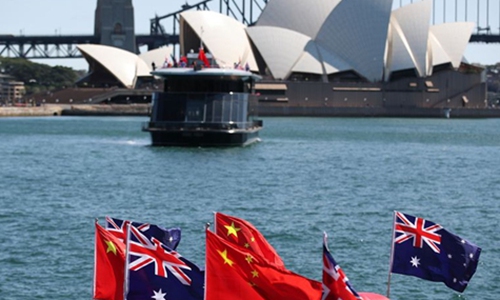SOURCE / INDUSTRIES
Tensions with Canberra offer openings for other farm suppliers

Chinese and Australian national flags are seen at an event in Sydney, Australia, September 8, 2019. Photo:Xinhua
Escalating tensions between China and Australia, which have caused declines of Australian agricultural exports to China in recent months, could offer opportunities for other producers to participate in the Chinese market.
Meanwhile, China can take the opportunity to diversify its import sources, industry insiders told the Global Times on Monday.
After China imposed anti-subsidy tariffs on Australian barley in May, making Australian barley less competitive in the Chinese market, opportunities arose for other barley suppliers to fill the gap, Li Guoxiang, a research fellow in the agricultural sector at the Chinese Academy of Social Sciences, told the Global Times on Monday.
Media reports have said that Argentina is jockeying to get more of its malt barley into Chinese beer-making industry. Argentina is expected to export 120,000 tons of barley to China this year, Reuters reported, citing Agustin Baque, the foreign trade chief.
"For the next season, if the Chinese maintain import taxes on Australian barley, I think it could double to 240,000 tons, maybe more, if barley farms in France and Canada have bad weather," Baque was quoted by Reuters as saying.
As the most populated country in the world, China has huge demand for barley, and Australia has been the top supplier. According to Chinese customs, Australia, Canada and France are major barley suppliers to China. Together they account for 95 percent of all imported barley in China, with Australia alone taking a share of more than 50 percent.
According to China's National Bureau of Statistics, barley imports from Australia increased to 6.48 million tons in 2017 from 3.87 million tons in 2014 - a 67-percent increase.
However, along with the increasing market share, the price of Australian barley declined to $198 per ton in 2017 from $288 in 2014, resulting in a sharp decrease of barley production in China.
Excessively low Australian prices dramatically decreased Chinese farmers' willingness to grow barley, a manager surnamed Wu in a grain trade company in East China's Jiangsu Province told the Global Times on Monday.
As a result of anti-subsidy and anti-dumping investigations against Australian barley initiated by China in 2018, and Beijing decided to impose a tariff of more than 80 percent on Australian barley in May to protect its barley industry.
"Australian barley has an advantage in terms of quality, but due to the tariffs and the anti-China sentiment in the country, instead of Australian barley, I will consider other countries such as France and Ukraine," Wu said.
"Canada was supposed to be a high-quality barley supplier. But the detention of Huawei's CFO Meng Wanzhou in 2018 has cast a shadow over China-Canada ties, resulting in unclear trade conditions," Wu added.
"Why would Chinese importers pay nearly double the price for somewhat higher quality Australian barley?" Li said.
"China should take the opportunity to further diversity its agricultural product import sources to hedge the risks of depending on a certain country," Li said, adding that in addition to barley, other agricultural products including soybeans from South American countries such as Brazil and Argentina are good choices.
"Even through China has the phase one deal with the US, with Beijing promising to buy more US farm products and implementing the deal, China should also consider other sources such as Brazil's soybeans, whose quality is also good," Li said.

